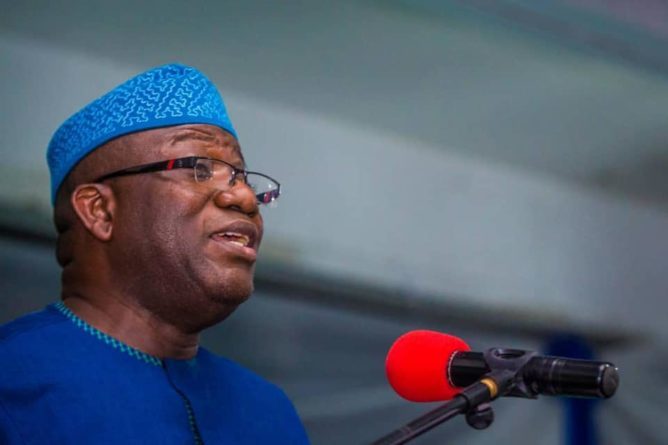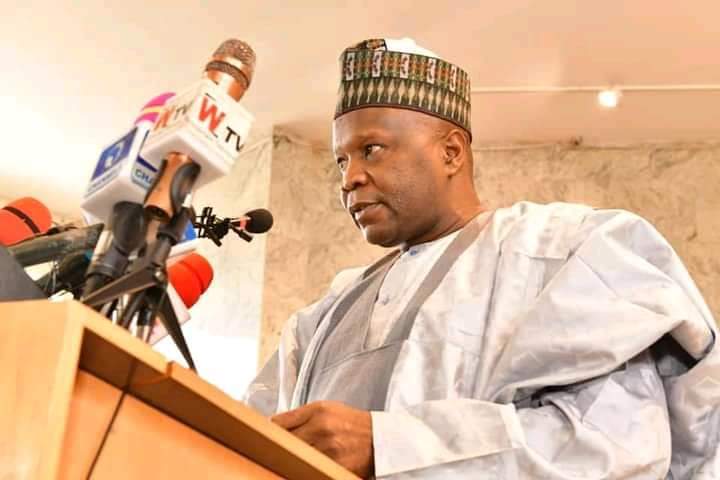Kayode Fayemi
BY MOYOSORE OGUNRUKU
For most Nigerians, the most objective metrics of rating government performance are the tangibles. A few good roads, especially dual carriageways and overhead bridges even in places they are not exactly priority; eye-catching shopping centres that will remain unoccupied for ages because of prohibitive rent and imposing school buildings lacking in requisite instructional facilities are some of the tangibles that get us oohing and ahhing.
Our elected officials, conscious of our (justifiable) appetite for these, focus on them almost exclusively because they provoke instant drool and attract approving phrases like “performing governor/president” or “uncommon transformation/transformer”. To the politician, they represent performance proof points, which are happily dressed up as “giant strides” in lavish, if not obsequious, advertorials.
To be clear, efforts at providing infrastructure, however half-hearted, tend to get our juices flowing. While some of these efforts are commendable, they are not the sole index of transformation. Real transformation, to my mind, is a much deeper concept, as it requires the fusion of tangibles and intangibles, in equal proportions, to create a self-running system that produces delightfully balanced and sustainable outcomes.
Advertisement
The world’s most progressive societies pay adequate attention to the intangibles because they are critical to the delivery of the tangibles and are reflective of leadership values. Among the intangibles are ethical capital, which shapes the complexion of leadership in a way that manifests the obligation to positively affect socio-economic affairs; belief in the ability of experts and in the efficiency of government and very crucially, inclination towards reform.
All of these, I have observed in Dr. Kayode Fayemi, governor of Ekiti State, whose progressive efforts at remedying the debilitating damage inflicted on the state between 2014 and 2018 have manifested in various ways, including the much sexier commitment to the provision of physical infrastructure that caters to the see-and-feel need of the populace.
Running alongside his infrastructure revamp initiatives are bold and deliberate attempts at instituting enduring reforms through laws, some of which he recently signed.
Advertisement
Big deal? This has to be a legitimate question, given his education, exposure and affiliation with progressivism. Answer to this question is provided by the recently signed laws and the potential to strongly stamp accountability, transparency and inclusivity on the governance process in Ekiti.
Unsurprisingly and for reasons not far-fetched, the one that has attracted most attention is the Local Development Council Area (LCDA) Law, which greenlighted the creation of 19 LCDAs in addition to the 16 local government areas that existed before the signing of the law. It may seem trite, but the law, among other things, will facilitate greater popular participation in governance, as it brings government closer to the people by deepening citizens’ understanding of the conduct of public business, reducing the chances of disruptive behaviour by citizens in seeking to get their concerns addressed, affording citizens greater access to and ability to influence policy/ decision-making process and providing smaller communities better representative opportunities in local governance and politics.
Very heartwarmingly, the law was the outcome of five months of consultations and engagement with communities in the 16 local government areas of the state by the Committee on LCDA Creation, which submitted a comprehensive report on issues that included the population of each of the proposed LCDAs, availability of personnel, proposed headquarters and economic viability.
Sequel to these were inter-ministerial meetings to review the committee report and make recommendations for the effective take off of the LCDAs in view of the subsisting economic climate. While the law creating the LCDAs got the most eyeballs, the most far-reaching for me are the Judiciary and Legislative Fund Management Laws.
Advertisement
Both laws provide for the financial autonomy of the legislative and judicial arms of government and were pursuant to the Memorandum of Action jointly signed by the Nigeria Governors Forum (NGF), of which Fayemi is Chairman; Conference of Speakers and the National Judicial Council (NJC) in May.
I see the laws as eminently capable of adequately codifying the relationship among the three governmental arms on revenue allocation, self-accounting and creating the opportunity to constantly interface on how resources, which are not inexhaustible, could be best deployed. Every slice of autonomy enjoyed by the judicial and legislative arms lessens dependence on the executive arm and can only be good for the citizenry.
Less attention-grabbing is the Office of the Attorney-General Law also signed by Fayemi. The law is aimed at increasing the efficiency of the Ministry of Justice, which provides professional legislative and legal services to the government and the citizenry by ensuring that government’s interventions in the justice sector are preserved for coming administrations to build on. The law also eases access to justice, especially for the underprivileged. Equally under the radar is the Economic Development Council Law for the establishment of an Economic Development Council with the mandate to promote partnership between public and private economic actors in ways that ensure business retention and expansion as a means of addressing unemployment in the state. By providing an environment that conduces to local and foreign investor involvement, the law will heighten prospects of economic growth and prosperity in the state. Deliberations on and eventual passage of the law were preceded by consultations with private sector players, who suggested closer engagement with relevant public institutions.
Also of interest to me is the Consumer Protection Law. In a society notorious for limp consumer protection structures, the law provides the consumer a shield against exploitation by providers of goods and services and in the event that the protection is breached, provides an avenue for redress for unfair trade practices. Immediately after he assented to the law, Fayemi directed the Ministry of Investment, Trade and Industries to put in place modalities for its implementation, an indication of how committed he is to the rights of the consumer. The Nigerian tendency to view steps such as these as cosmetic cannot be dismissed. The fact of their existence, however, points to baby steps towards becoming a progressive society. Progressive societies are run by progressive-minded people and it is safe to say, Fayemi’s education and exposure to some of the world’s most progressive societies have impacted his world view.
Advertisement
Advertisement
Views expressed by contributors are strictly personal and not of TheCable.






